Index relies entirely on the support of donors and readers to do its work.
Help us keep amplifying censored voices today.
[vc_row][vc_column][vc_column_text]
[/vc_column_text][vc_custom_heading text=”28 Incidents” use_theme_fonts=”yes”][/vc_column][/vc_row][vc_row][vc_column][vc_column_text]
 27 April 2019 – In Makhachkala, armed police officers broke into an apartment belonging to the parents of 26-year-old Alexandr Gorbunov, who was earlier named by RBK as an author of popular anonymous Telegram channel Stalingulag, known for outspoken, often slangy criticism of the authorities, Stalingulag reported. As reported by the channel, Gorbunov’s mother had been interrogated for six hours.
27 April 2019 – In Makhachkala, armed police officers broke into an apartment belonging to the parents of 26-year-old Alexandr Gorbunov, who was earlier named by RBK as an author of popular anonymous Telegram channel Stalingulag, known for outspoken, often slangy criticism of the authorities, Stalingulag reported. As reported by the channel, Gorbunov’s mother had been interrogated for six hours.
According to Stalingulag, police wanted Gorbunov on suspicion of “phone terrorism”, related to a series of phone calls with bomb threats that turned out to be fake but caused mass evacuations in Moscow. “How original, before they used to just plant drugs”, the author commented in his Telegram channel, referring to a known tactic of criminal case fabrication against activists.
Links: https://t.me/stalin_gulag/943
https://echo.msk.ru/news/2415761-echo.html
Categories: Arrest/Detention/Interrogation; Criminal Charges/Fines/Sentences
Source of violation: Police/State security
26 April 2019 – In Moscow court ruled in favour of the Federal Security Service (FSB) in its defamation suit against independent newspaper Novaya Gazet, Moskva news agency reported.
The FSB called the coverage false and demanded the deletion of two articles that said that FSB officers were torturing a Kyrgyz national detained after a blast in Magnitogorsk residential building.
Novaya Gazeta said it is going to appeal the court decision.
Links: https://www.mskagency.ru/materials/2885053
Categories: Subpoena / Court Order/ Lawsuits
Source of violation: Court/Judicial
26 April 2019 – Nikita Telizhenko, a journalist at the Kurgan bureau of Znak.com was summoned for interrogation to the counter-extremist department of the local police, Znak.com reported.
According to Telizhenko’s lawyer, the official reason for the questioning is a strange letter sent to the Russian president. The letter was signed with Telizhenko’s name, saying that he does not support Valdimir Putin’s policies, believes in Adolf Hitler’s Nazi ideas which the letter said inspires the Kurgan opposition movement.
The journalist denies that he is the author of the letter or has ever written similar material. Znak.com said it believes that the letter was a provocation against Telizhenko to pressure him psychologically.
Categories: Arrest/Detention/Interrogation; Intimidation
Source of violation: Police/State security; Unknown
24 April 2019 – Russia’s national TV channels were reportedly told “not to praise too much” Vladimir Zelensky, the newly elected president of Ukraine, according to Proekt which cited an anonymous high-profile public official as its source.
According to the official, TV reports shown on Russian national channels were seen by the presidential administration as too flattering.
Proekt said that on 14 April, the host Dmitry Kiselev of Vesti Nedely (Eng: News of the Week) praised Zelensky. However on the next episode, which aired after the recommendation, Kiselev’s tone was less complimentary. Authors of a similar show at First Channel were also very cautious and slightly criticised Zelensky in contrast with previous positive coverage of his candidacy against the then-serving president and Kremlin opponent Petro Poroshenko.
Links:
https://www.proekt.media/article/zelensky-federalnye-tv/
Categories: Soft censorship
Source of violation: Government/State Agency/Public official(s)/Political party
23 April 2019 – Senator Elena Mizulina asked her lawyers to check media that published her quotes on internet regulation “the bans are the freedom”, RIA Novosti reported.
“The actions of several media that distributed the quote out of context along with distorted information, are now being checked by lawyers”, the press-service of Mizulina said.
The quotes by Mizulina were published by Novaya Gazeta, agency Moskva and others.
Links:
https://ria.ru/20190423/1552966635.html
https://mbk-news.appspot.com/news/mizulina-proverit-smi/
Categories: Legal Measures
Source of violation: Government/State Agency/Public official(s)/Political party
23 April 2019 – State news agency TASS published and after a few hours deleted an opinion column “Shag” (Eng: The Step) by prominent journalist Dmitry Bykov, Snob.ru reported.
In the column, Bykov said that the current period of Russian history will be remembered as “an example of meanness and shameful idiocy”, explaining that the current national idea is based only on threats and pressure. “In fact, the Russian land is now behind a khan, a crime boss, a kingpin; though it would be a mistake to think it is the nature Russians, they are actually inclined to trust people like this”, Bykov wrote.
He went on, criticising the desire of Russian people to belong to the majority and calling to dispel the hypnosis of the word “motherland”, as this word is used when the government needs to do some shady business.
“To love the motherland today means not to identify with it in any way, and even more so with the authorities that are causing new and new abominations. And it would be good, if it was large-scale abominations, but it is streetwise dirty tricks”.
The column was deleted from TASS website and soon republished on the website Russian Pioneer.
Links:
https://tass.ru/kultura/6367542
http://ruspioner.ru/honest/m/single/6221
Categories: Censorship
Source of violation: Employer/Publisher/Colleague(s)
19 April 2019 – State oil company Rosneft filed a complaint with police to “stop unlawful activity of pseudo agency” Reuters in Russia, Kommersant reported.
A day before, Reuters published an investigation that revealed the scheme that Venezuelan authorities were using to avoid US sanctions that prohibit American companies from buying Venezuelan oil. According to Reuters, Rosneft serves as a middle company, buying oil from the Venezuelan state company PDVSA with a discount and then selling it to a real buyer for the full price, while keeping the difference as a commission and transferring it to PDVSA’s accounts in Russian banks. Rosneft called the publication “an information sabotage” and “provocation”.
Update:
On 23 April 2019, Reuters corrected the article “to make clear Reuters could not determine payments were made under the proposed arrangement” and removed referencse to Evrofinance Mosnarbank; the agency also added that experts see no violation of sanctions in the revealed scheme.
Links: https://www.kommersant.ru/doc/3951683
https://www.forbes.ru/biznes/375245-reuters-popravil-statyu-o-venesuele-posle-ugroz-rosnefti
Categories: Legal Measures; Censorship
Source of violation: Corporation/Company; Government/State Agency/Public official(s)/Political party
18 April 2019 – Сriminal investigation officers searched the Moscow office of news agency Rosbalt, seized computers belonging to one of the journalists and requested passwords for all editorial computers, Rosbalt reported.
The editor-in-chief Nikolai Ulyanov said that the search is connected to a criminal case opened on a defamation complaint filed by oligarch Alisher Usmanov. The complaint was not related to Robalt articles, but to the posts of Rosbalt journalist Alexandr Shvarev on other websites, including the blocked website rucriminal.info.
Background:
In November 2018, Usmanov filed a defamation case against A.M. Volkov and rucriminal.info over a publication proving the link between Alisher Usmanov and crime boss Shakro Molodoy. Rosbalt says that Сriminal investigation officers used “Shakro Molodoy” for word search while checking editorial computers.
The seizure of Shvarev’s computer could be connected to the search of evidence and information about sources for previously published articles, Rosbalt suggests. The agency said that Shvarev had never published articles about Usmanov at Rosbalt, but he had a right to work for other media and use a pseudonym for his publications.
Links:
https://ovdinfo.org/express-news/2019/04/18/v-moskve-v-ofis-rosbalta-prishli-policeyskie
https://www.novayagazeta.ru/articles/2019/04/24/80336-iskali-to-ne-znayut-chto
Categories: Attack to Property
Source of violation: Police/State security
16 April 2019 – State news agency TASS removed a series of quotations by Nikolai Patrushev, the secretary of the Security Council of Russia and the ex-head of Federal Security Service (FSB), which was noticed by an editor of Current Time.
The quotations were direct accusations that the USA is worsening the Iran and North Korea crisis. The quotes were annulled as “wrongly published”
Links:
https://www.facebook.com/permalink.php?story_fbid=2648904765125195&id=100000170936377
Category: Censorship
Source of violation: Government/State Agency/Public official(s)/Political party
15 April 2019 – The bailiffs of the Penza garrison military court refused to let journalists cover an open trial of extremist organisation Set (Eng:Net). Defendants said that the charges were fabricated by secret services, 7×7 reported.
The bailiffs told 7×7 reporters that the courtroom was full, however the journalists could see via video link that the courtroom was in fact empty.
Links:
https://7×7-journal.ru/anewsitem/119860
Category: Blocked Access
Source of violation: Court/Judicial
15 April 2019 – The prosecutor’s office issued a remedial action order to Baidavlet Taibergenov, the head of Agapovsky district administration in the Chelyabinsk region, after finding out that its contract with the local Zvezda newspaper required the outlet to submit newspaper layouts to the district administration for approval, which violates the law prohibiting censorship, Znak.com reported.
The prosecutor’s office fined the administration’s press-secretary 5,000 roubles (70 euro) for not providing journalists with requested information in the legally required period.
Earlier the administration deprived the newspaper of a municipal contract for the publication of legal acts because the journalists refused to submit editorial materials for approval. The check by the prosecutor’s office was initiated by Russian Union of Journalists.
http://magnitogorsk.bezformata.com/listnews/chinovnikov-administratcii-agapovskogo/74227203/
Categories: Censorship; Soft censorship
Source of violation: Government/State Agency/Public official(s)/Political party
11 April 2019 – Russia-24 aired a report about a workshop hosted by international network Barents-Press for Russian journalists in Murmansk, vilifying the organisers and speakers as opinionated Russophobes. The regional branch of the Russian Union of Journalists condemned the defamatory report, saying that it was “clearly aimed to discredit the respected organisation Barents Press” and hurt international cooperation between journalists.
Links:
https://www.vesti.ru/videos/show/vid/794482/cid/1#
Categories: Intimidation
Source of violation: Employer/Publisher/Colleague(s)
9, April – Andrey Surovtsev, a reporter for the online Sota Vision, was assaulted by security guards at a dormitory in Omsk, where about a thousand of Chinese workers are housed, Kasparov.Ru reported.
Surovtsev was filming a bus ferrying Chinese workers from a local oil plant to the dormitory, when two security guards approached him and tried to interfere. When Surovtsev warned them that they were obstructing journalistic activities, one of them replied: “I don’t care about your laws”.
The security guards grabbed Surovtsev’s equipment, twisted his arm behind his back and took his smartphone and documents. When the guards heard Suvortsev calling the police, they returned him his belongings. However, the video made with the journalist’s smartphone was deleted.
The day after Surovtsev confirmed his injuries in a local hospital and filed a complaint about the incident to the police.
Links:
http://www.kasparov.ru/material.php?id=5CAC86A4F4064
https://www.arsvest.ru/rubr/2/57423
Categories: Physical Assault/Injury; Attack to Property
Source of violation: Private security
6 April 2019 – North Ossetia regional website Osnova.News published an article describing how the press service of North Ossetia administration had barred independent journalists from news conferences and avoided answering their calls and information requests.
On 5 February 2019 there was a news conference by the government of the republic scheduled. Ahead of it, the head of North Ossetia administration’s press service officer Fatima Sabanova called the Osnova.News office and asked what questions its reporter was going to ask. When Sabanova learnt that it would be Alina Alikhanova, who was going to attend the news conference, she demanded to the outlet send another reporter. Sabanova said that Alikhanova did not have an accreditation, despite the two accreditation requests sent by the outlet in advance of the conference.
The news conference was canceled last minute. The press conference was rescheduled for 26 March but the announcement was made unofficially in a Facebook post. When the journalists of Osnova.News learned about the new date of the news conference, they tried to reach Sabanova to get an accreditation, but the calls were ignored.
Osnova.News described another incident that took place in March. Reporter Zaur Farniev, who is said to be on a list of “undesirable and objectionable” journalist, was allowed to attend a meeting of the head of North Ossetia administration, Vyacheslav Bitarov, with constituents for the first time in 2.5 years. However, each time Farniev tried to capture video at the meeting, he was asked to stop without any explanation. The press service later published its own video which significantly cut answers of the official, edited in a flattering way.
Links: http://osnova.news/n/2657/
Categories: Blocked Access
Source of violation: Government/State Agency/Public official(s)/Political party
6 April 2019 – In the Krasnodar region, journalist Alexandr Savelev was fined 5,000 roubles (70 euro) for “publication of symbols of undesirable organisation” after he reposted a Facebook post made in the group “Open Russia// Krasnodar region”, Ovd.info reported.
The post included an infographic showing the increase of prices of goods in the last 10 years and contained the logo of Open Russia.
In 2017, Russia’s general prosecutor office recognised Open Russia, founded by an exiled oligarch Mikhail Khodorkovsky, as an “undesirable organisation”. In March 2018, Open Russia announced its liquidation in order to protect its activists, who regularly faced prosecution.
Links:
Categories: Criminal Charges/Fines/Sentences
Source of violation: Police/State security; Court/Judicial
5 April 2019 – The Investigative Committee of Chuvashia republic opened a criminal case against local blogger Konstantin Ishutov, 7×7 reported. The new criminal case opened under the Article 354, Part 1 of the Criminal code of Russia (Nazism rehabilitation) in relation to a post in LiveJournal in 2010. In that post Ishutov criticized Chuvashia authorities for not taking care of the graves of the soldiers killed in World War II, comparing it to the way the Germans take care of similar graves.
In 2018, a similar criminal case on Nazism rehabilitation was opened against Ishutov because of the post with Third Reich’s leaflet and capture “When the Third Reich treats Soviet people better than Putin treats Russians”.
Also, in March,2019, the Investigative Committee of Chuvashia republic opened a criminal case against Ishutov on suspicion of child pornography production.
Ishutov is known for his publication about the falsifications at elections. In 2017, he was also sued for reposting an investigation about corruption schemes involving the prime minister Dmitry Medvedev – the police demanded to delete it, but in 2018 the Supreme Court of Chuvashia ruled in favor of blogger.
Links:
Categories: Criminal Charges/Fines/Sentences
Source of violation: Police/State security
4 April 2019 – A Sverdlovsk regional court started trial on the defamation lawsuit filed by Sergey Morozov, the head of Kultaevo village, against local media Properm.ru, the website reported.
The official stated that an article about a prosecutors’ check of his family business “morally hurt him, caused health worsening, worries and sleep disorder”. Morozov’s suit seeks 100,000 roubles (1,386 euro) compensation and retraction of the publication. Earlier the official filed defamation lawsuits against three social media users who reposted the publication.
Links:
https://properm.ru/news/society/168719/
https://properm.ru/news/incident/162592/
https://www.kasparov.ru/material.php?id=5CAC9592B4D8D§ion_id=43452BE8655FB
Categories: Legal Measures
Source of violation: Government/State Agency/Public official(s)/Political party
4 April 2019 – Former editor-in-chief of Verkheuralsk municipal newspaper Krasniy Uralets, Nikolay Batavin, sent an open letter to the deputy governor of Chelyabinsk region Alexey Texler, Znak reported.
In the letter Batavin said that due to the journalists’ conflict with the head of Verhneuralsk district administration Sergey Aybulatov, the accounts of Krasniy Uralets were blocked, as a result the newspaper’s journalists were left without salary for over three months.
Links:
https://news.sputnik.ru/ekonomika/c45e2dd1ac16d91bb3f421051d2ad64d9fae698d
Categories: Censorship – Commercial interference
Source of violation: Government/State Agency/Public official(s)/Political party
4 April 2019 – Yulia Shevchuk, the editor-in-chief of the municipal newspaper Novaya Kondopoga was fired after a conflict with local officials, 7×7 website reported.
The decree to fire Shevchuk was signed by a deputy head of the administration of the Kndopoga district. Officials say Shevchuk was fired because of declining income at the newspaper.
However, Shevchuk believes that the reason was her independent editorial policy. “The administration head believes that the newspaper tells about social and political life in the district in a wrong way. He doesn’t say directly ‘I forbid you to write about this and that’, but he means it – don’t write about this or write about that in this way to not disturb people, to not rock the boat”, Shevchuk told 7×7.
In May 2018, economic crime officers searched Novaya Kondopoga office and seized documents. Though there was no criminal case opened after that (the newspaper had no debts and earned 119,000 roubles – around 1,650 euro), Vitaly Sadovnikov, the head of the district administration, said that the check revealed violations of financial and labour norms and suggested to a disciplinary action regarding Shevchuk. The municipal deputies voted in approval. According to the law, a disciplinary action could be in a form of rebuke, reprimand or dismissal. There was no explanation why the harshest form was chosen.
In March 2019, the Russian Union of Journalists published an open letter to the head of Kondopoga district administration, saying that the financial state of the newspaper was stable and adequate for a local outlet. The union also pointed out that the administration did not have a right to take disciplinary action against the newspaper editor-in-chief. “Additionally, the pressure from the administration, in our opinion, may be linked to the independency of the editor-in-chief in the choice of topics, her desire to tell not only about successes of the city and district authorities, but about the problems of locals as well, about things that common people – the readers of the newspaper – are worried about”.
After the letter from the Russian Union of Journalists, the head of the district administration Vitaly Sadovnikov visited the Novaya Kondopoga office. “He said that the newspaper was, is and will be working”. He also told the head of Karelia Union of Journalists Evgeny Belyanchikov, that he was not going to fire Shevchuk. However, soon after, the administration issued a decree firing the editor, which was signed by Sadovnikov’s deputy.
Shevchuk said she disagrees with her termination and is going to file a lawsuit about unlawful employment termination.
Links:
http://smikarelii.ru/node-50-article
Categories: Censorship; Loss of Employment
Source of violation: Government/State Agency/Public official(s)/Political party
3 April 2019 – The regional branch of the Federal Antimonopoly Service launched a check of the Krasnoyarsk-based newspaper Prospekt Mira because of a caricature with an image of the Universiade’s mascot on the front page of the December issue, Prospekt Mira reported.
The caricature featured a dog similar to the Universiade mascot warming next to a fire with a title “After the money” and was referring to the student games that took place in March 2019 in Krasnoyarsk and was associated with a series of money misuse scandals.
The check was started on the complaint of the executive board of the Universiade that considered the use of the image a violation of the trade mark rights.
“Such actions by the Universiade are pressure on the media, obstructing our journalistic activities. They want to force us to write only good things about the Universiade, to prohibit the raising of problematic issues. After all, after this event there will obviously be a whole tail of consequences: criminal cases, scandals, trials ”, said the publisher of Prospekt Mira, Ilya Labunksy.
On 21 March, the regional prosecutor’s office also started a check of Prospekt Mira on a complaint brought by the executive board of the Universiade about the trademark rights.
Links:
https://zona.media/news/2019/03/21/prospekt-mira
Category: Subpoena / Court Order/ Lawsuits
Source of violation: Government/State Agency/Public official(s)/Political party
3 April 2019 – Sports journalist Vasily Utkin was assaulted with mace spray by an unknown man, the journalist said on his Telegram-channel.
The assault happened in the late evening after a training of an amateur football team Egrisi, where Utkin is a frequent visitor.
A young man in a grey hoodie approached Utkin next to the journalist’s car and sprayed mace in his face; the assailant, who was filming the assault with his smartphone said “for the accountability record”, according to Utkin.
Utkin said “There are only one reason and only two people who would like to organise this. I was talking about it in the last episode of my show”, referring to his YouTube show Footbal Club. On the last episode covering the so-called Aguzarov-gate – a scheme in which lawyer Alan Aguzarov, a personal attorney for the head coach of Russian national football team Stanislav Cherchesov and a nephew of the ex-head of North Ossetia-Alania, was using his connections to Cherchesov to influence over football players and sign them up for contracts, promising to help them to get selected for the national team.
Utkin decided not to file a complaint about the assault, saying it would be just a waste of time for him.
Links:
https://www.youtube.com/watch?v=xByYo8NHQiY&feature=youtu.be
https://lenta.ru/news/2019/04/03/utkin_napadenie/
Categories: Physical Assault/Injury; Intimidation
Source of violation: Unknown
2 April 2019 – A Saint Petersburg court barred TV journalists from filming a trial of the suspected organisers of the 2017 metro blasts, Regnum reported.
Lawyers for the defendants, who pleaded not guilty, asked the court to allow media coverage. The prosecutor insisted on closed trial. The court partially agreed with the prosecutor, prohibiting filming.
Links:
https://regnum.ru/news/2603524.html
https://jourdom.ru/news/108489
Categories: Blocked Access
Source of violation: Court/Judicial
2 April 2019 – In Khabarovsk Alexey Kaper, the editor-in-chief of local media Khabarovsk.today, was summoned by police for interrogation, Khabarovsk.today reported.
The interrogator told Kaper that his questioning was a part of a check started on a complaint from Arkady Mkrtychev, the head of the local department of the ruling party United Russia and former head of Khabarovsk regional government, regarding posts about him in anonymous Telegram-channels.
The journalist understood from the questions he was asked, that Mkrtychev believes that it Kaper who is the author of Telegram-channel known as Vecherny Khabarovsk. Kapers denies that he has any involvement with this Telegram-channel. The journalist was also asked if he knows authors of other Telegram-channels, such as Nedebri and Korifey Khabarov.
Kaper himself believes that the interrogation was connected to the publication of a recorded closed-door meeting between the regional parliament speaker and the secretary of the regional department of United Russia Sergey Lugovskoy with party members, in which he said that the party is able to solve many regional problems, but is not acting because it would look like an achievement of the local governor, not the party.
Kaper also said that on 1 March Khabarovsk.today received an email from a representative of an unknown PR agency offering money for removal of an article about Arkady Mkrtychev’s involvement in illegal caviar trading. Kaper refused to do so and said that he believes it was a provocation staged to charge him with corrupt business practices.
Links:
https://zona.media/news/2019/04/03/habarovsk
https://lenizdat.ru/articles/1155569/
Categories: Arrest/Detention/Interrogation
Source of violation: Police/State security; Government/State Agency/Public official(s)/Political party
2 April 2019 – Russia’s parliament approved in the first reading a bill about fines for distribution of foreign press in Russia “without permission”, the statement said on the official website of the parliament.
The amendments to the media law, obliging foreign press distributors to seek official permission from the Russian state media regulator Roskomnadzor, were approved in 2017. The new bill will classify a violation of such norms as an administrative offence and will introduce a punishment in the form of fines up to 30,000 roubles (around 418 euro). Also, according to the bill, printed copies of foreign press distributed without permission should be seized.
There is no clarity so far on whether the bill will work only for mass distribution or could be used to punish even distribution for personal use as if one orders a foreign magazine from abroad or brings it home from a foreign trip.
Links:
http://sozd.duma.gov.ru/bill/632800-7
https://www.fontanka.ru/2019/04/02/098/
Categories: Legal Measures
Source of violation: Government/State Agency/Public official(s)/Political party
1 April 2019 – Konstantin Semin, host of Agitation and Propaganda, a show on state-owned TV channel Rossiya-24, was forced to quit his job after publishing a letter from an employee of Samara-based aerospace manufacturer Progress on his personal Youtube channel.
The letter criticised state space agency Roskosmos, Semin said in a video.
After his resignation, Semin was summoned for a talk with the head of Roskosmos Dmitry Rogozin, who spoke for over an hour about a “black PR campaign” aimed at discrediting his efforts to help Russia’s space industry to recover.
Links:
https://www.youtube.com/watch?v=SpU9jhjgeZs
http://glavnoe24.ru/topics/9114/
Categories: Censorship; Loss of Employment; Intimidation
Source of violation: Employer/Publisher/Colleague(s); Government/State Agency/Public official(s)/Political party
1 April 2019 – The Russian state media regulator Roskomnadzor sent two requests to local website Yarkub, demanding it delete an article about graffiti that allegedly insulted the President Vladimir Putin, Yarkub reported.
Initially Yarkub received an email demanding the article be deleted by midnight. The editor-in-chief later received a phone call from the regional department of Roskomnadzor. The regulator officials did not explain what laws were violated. Yarkub said that the editorial office sees the situation as an act of censorship.
The article in question titled “Police began search of a man, who left an insulting graffiti on the building of Yaroslavl ministry of internal affairs” was published in the morning of 1 April. The graffiti “Putin pidor” allegedly suggested in an explicit form that Russian president Vladimir Putin is gay. The graffiti was not seen in the published photos and the derogatory word was replaced with *-symbols.
Update:
2 April 2019 – Another email from Roskomnadzor clarified that the article should be deleted due to the new law about “disrespecting authorities” that came into force on 29 March 2019, TJ reported.
Editor of another Yaroslavl area media outlet, 76.ru, Olga Prokhorova wrote in her Facebook, she also received five calls from Roskomnadzor with requests to delete a similar article about the graffiti. She was told by the officials that they are pressed “from far above” to prosecute media that published articles on the subject. However, the general prosecutor’s office, that according to the law has the power to request such actions from Roskomnadzor denied any involvement, Interfax reported.
Meanwhile, at least five other Yaroslavl media outlets removed similar articles about the graffiti: Echo Moskvy; PRO Gorod; Pervy Yaroslavsky; Moskovsky Komsomolets-Yaroslavl. However, those media deny receiving official requests from Roskomnadzor.
Update:
11 April 2019 – Roskomnadzor blocked the Yarkub website after the outlet refused to delete articles about the graffiti denigrating Putin. The decision was made on 9 April and the official reason for blocking was the news article about a suicide attempt of an autistis teenager published on 9 June 2018, almost a year ago. (Since 2012, the law “About protection of children from information harmful to their health and development” forbids media to describe suicide methods).
“It is worrying to think that Roskomnadzor is roughly finding fault and seeking revenge for our position regarding the article on the graffiti about Putin left on the wall of ministry of internal affairs”, Yarkub editor Marina Sedneeva wrote in a Facebook post. Yarkub filed a complaint regarding Roskomnadzor actions to the investigative committee.
Update:
13 April 2019 – Roskomnadzor blocked the 76.ru website after the media outlet refused to refused to delete articles about the graffiti denigrating Putin. In response, 76.ru editor-in-chief, Olga Prohorova, removed a photo of the graffiti from the article, while keeping the article on the website. Later in the same day Roskomnadzor unblocked 76.ru’s website.
Update:
14 April 2019 – Roskomnadzor unblocked Yarkub website after the media deleted an article from June 2018 about a suicide, which was the formal reason given for the blocking of the outlet’s wesbite.
Links:
https://www.interfax.ru/russia/656792
https://www.facebook.com/photo.php?fbid=2212506988816501&set=a.138954256171795&type=3&theater
https://www.svoboda.org/a/29874717.html
https://zona.media/news/2019/04/13/76ru
https://www.vedomosti.ru/technology/news/2019/04/13/799066-smi
Categories: Intimidation; Censorship; Legal Measures
Source of violation: Government/State Agency/Public official(s)/Political party
1 April 2019 – Saint Petersburg photographer David Frenkel was summoned into a police department to draw up a protocol of administrative violation, Fontanka reported.
When photographer called the police department to clarify the details, he was told that the police consider him a participant of unsanctioned action staged by a group of feminists on 8 March 2019, that he covered as a photographer.
The action was spontaneously organised after activists of pro-government movement Set broke into women-only café Simona “to congratulate” the owners with flowers, despite the owners’ repeated requests for the Set supporters to leave. After that three activists staged a protest with a naked man under a pile of flowers and the slogan “Your flowers will grow on a grave of the patriarchy”.
Links:
https://www.fontanka.ru/2019/04/01/148/
https://lenizdat.ru/articles/1155620/
https://twitter.com/merr1k/status/1112721459162611712
Categories: Arrest/Detention/Interrogation
Source of violation: Police/State security
1 April 2019 – In Ekaterinburg unknown people broke into the editorial office of a regional department of the national newspaper Kommersant during the night between 31 March and 1 April, the general director Kommersnt-Ural Sergey Plakhotin told E1.RU.
The intruders vandalised the room with editorial servers, damaged computers belonging to the director, the editor-in-chief and the accountant, and stole two hard drives from the editor-in-chief’s computer. They also left a paper with message “You are going to die, small fry” on the table in the general director Sergey Plakhotin’s office. According to the police, the overall damage is estimated of 70,000 roubles (about 968 euro).
Kommersant journalists believe that the attack may be linked to the publication of the book “Gangs catchers. The meeting point” about the fight against organised crime in Ekaterinburg.
UPDATE:
2 April 2019 – Police detained a suspect, who they said turned out to be an unemployed 46-year old resident of Ekaterinburg. Police opened a criminal case against the individuals on the charges of “Intentional damage to property”, punishable with up to five years in jail. According to the police, the suspect pleaded guilty and committed the crime under the influence of alcohol and because of “personal motives”, not connected to the journalistic activity of Kommersant editorial team. The suspect was released on with travel restrictions.
Links:
https://ura.news/news/1052378986
https://www.rbc.ru/rbcfreenews/5ca3104b9a7947d7a9b3f570
Categories: Intimidation; Attack to Property
Source of violation: Known private individual(s)[/vc_column_text][/vc_column][/vc_row][vc_row][vc_column][vc_basic_grid post_type=”post” max_items=”4″ element_width=”6″ grid_id=”vc_gid:1560948373790-0b4f0460-bf1a-5″ taxonomies=”8996″][/vc_column][/vc_row]
[vc_row full_width=”stretch_row_content_no_spaces” full_height=”yes” content_placement=”middle” css_animation=”fadeIn” css=”.vc_custom_1521806157541{margin-top: 0px !important;background-image: url(https://www.indexoncensorship.org/wp-content/uploads/2018/03/MMF_2017_web-cover.jpg?id=98589) !important;background-position: center !important;background-repeat: no-repeat !important;background-size: contain !important;}”][vc_column][/vc_column][/vc_row][vc_row css_animation=”fadeIn” css=”.vc_custom_1521805928920{margin-top: 0px !important;}”][vc_column][vc_row_inner][vc_column_inner][vc_column_text]
[/vc_column_text][/vc_column_inner][/vc_row_inner][/vc_column][/vc_row][vc_row equal_height=”yes”][vc_column][vc_custom_heading text=”Deaths” use_theme_fonts=”yes”][vc_column_text]
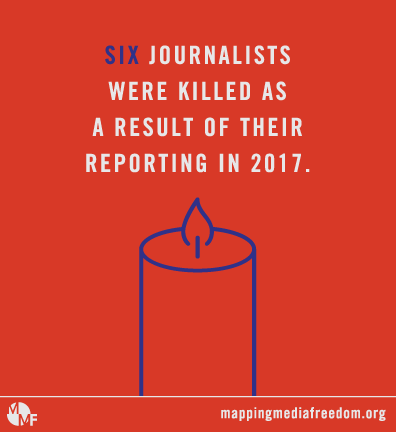 Six journalists were killed as a result of their reporting in 2017.
Six journalists were killed as a result of their reporting in 2017. [/vc_column_text][/vc_column][/vc_row][vc_row][vc_column][vc_custom_heading text=”Physical assaults and injury” use_theme_fonts=”yes”][vc_column_text]
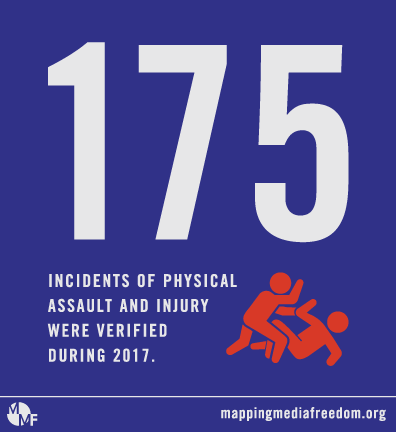 Mapping Media Freedom documented 175 verified incidents of assault and injury, 109 of which occurred in just five countries: Russia (47), Spain (19), Ukraine (18), Italy (15) and France (10).
Mapping Media Freedom documented 175 verified incidents of assault and injury, 109 of which occurred in just five countries: Russia (47), Spain (19), Ukraine (18), Italy (15) and France (10). [/vc_column_text][vc_custom_heading text=”Arrests/Detainments” use_theme_fonts=”yes”][vc_column_text]
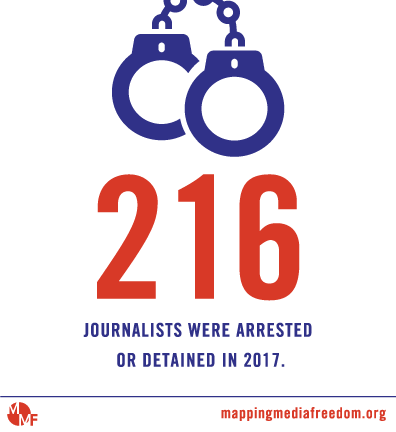 A total of 216 journalists were arrested or detained in 2017, including 21 in Azerbaijan. On 5 July Afgan Mukhtarli was kidnapped from Georgia, where he had lived in self-imposed exile for three years, and taken to Azerbaijan. While in prison, he suffered serious health problems and lost a significant amount of weight. In January 2018 he was sentenced to six years in prison by an Azerbaijani court.
A total of 216 journalists were arrested or detained in 2017, including 21 in Azerbaijan. On 5 July Afgan Mukhtarli was kidnapped from Georgia, where he had lived in self-imposed exile for three years, and taken to Azerbaijan. While in prison, he suffered serious health problems and lost a significant amount of weight. In January 2018 he was sentenced to six years in prison by an Azerbaijani court. [/vc_column_text][vc_custom_heading text=”Criminal charges/civil lawsuits” use_theme_fonts=”yes”][vc_column_text]
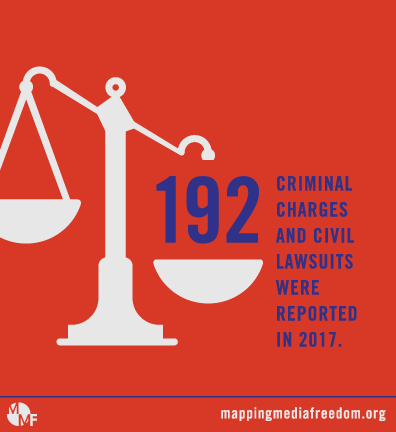 There were 192 cases of criminal charges or civil litigation reported to Mapping Media Freedom in 2017. In Italy, lawsuits demanding millions of euros in damages were filed throughout the year. In March Claudio Riva, former owner of the steelworks company Ilva, sued newspaper Gazzetta del Mezzogiorno for €2.2 million in damages, for publishing an article about pollution allegedly linked to the company’s operations in Taranto. Riva’s lawyers asked for €550,000 in compensation for each of the four damaged parties: Riva Forni Elettrici SPA, Claudio Riva, Fabio Arturo Riva and Nicola Riva. In October Il Locale News was sued for €1 million by Giancarlo Guarrera, an engineer and director of Airgest, the company that manages Trapani airport in Sicily. On 8 November 2016 Il Locale News featured an article on financial issues at Airgest.
There were 192 cases of criminal charges or civil litigation reported to Mapping Media Freedom in 2017. In Italy, lawsuits demanding millions of euros in damages were filed throughout the year. In March Claudio Riva, former owner of the steelworks company Ilva, sued newspaper Gazzetta del Mezzogiorno for €2.2 million in damages, for publishing an article about pollution allegedly linked to the company’s operations in Taranto. Riva’s lawyers asked for €550,000 in compensation for each of the four damaged parties: Riva Forni Elettrici SPA, Claudio Riva, Fabio Arturo Riva and Nicola Riva. In October Il Locale News was sued for €1 million by Giancarlo Guarrera, an engineer and director of Airgest, the company that manages Trapani airport in Sicily. On 8 November 2016 Il Locale News featured an article on financial issues at Airgest. [/vc_column_text][vc_custom_heading text=”Legal measures” use_theme_fonts=”yes”][vc_column_text]
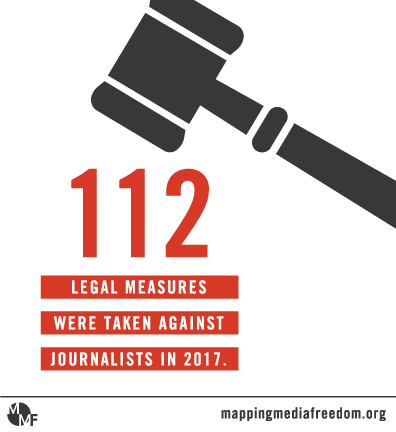 There were 112 legal measures taken against journalists in 2017. In the United Kingdom, the offshore company Appleby, which was at the heart of the Panama Papers scandal, launched breach of confidence proceedings against the Guardian and the BBC on 18 December, in an attempt to force them to disclose the documents used in the investigation. Appleby said the documents were stolen in a cyberattack and there was no public interest in the revealing of their contents.
There were 112 legal measures taken against journalists in 2017. In the United Kingdom, the offshore company Appleby, which was at the heart of the Panama Papers scandal, launched breach of confidence proceedings against the Guardian and the BBC on 18 December, in an attempt to force them to disclose the documents used in the investigation. Appleby said the documents were stolen in a cyberattack and there was no public interest in the revealing of their contents.[/vc_column_text][vc_custom_heading text=”Job loss” use_theme_fonts=”yes”][vc_column_text]
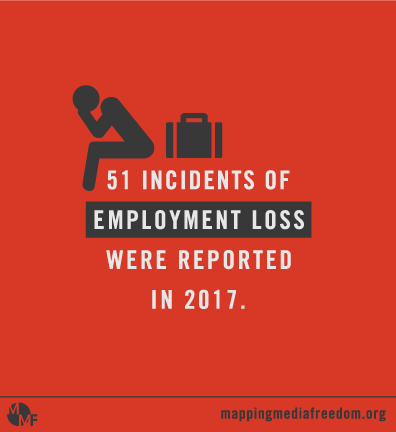 There were 51 reports of job loss recorded on Mapping Media Freedom throughout 2017, more than half of which came from Russia (13), Poland (8) and Spain (5).
There were 51 reports of job loss recorded on Mapping Media Freedom throughout 2017, more than half of which came from Russia (13), Poland (8) and Spain (5). [/vc_column_text][vc_custom_heading text=”Intimidation” use_theme_fonts=”yes”][vc_column_text]
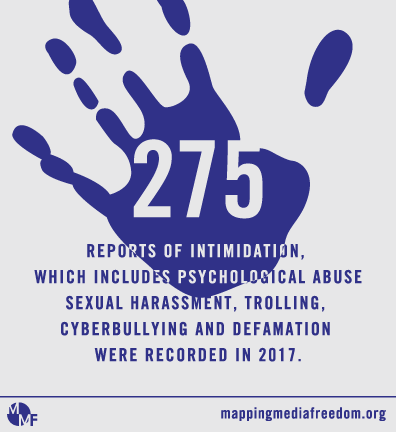 Intimidation was widespread across Europe in 2017, with 275 incidents reported to the map. In the United Kingdom, the BBC’s political editor Laura Kuenssberg was assigned a security detail at the Labour party conference in late September following online threats and abuse. The journalist attracted anger from some Labour supporters for her coverage of the 2016 Labour leadership race and the party’s poor performance in local elections, while a petition for her to be fired received 35,000 signatures.
Intimidation was widespread across Europe in 2017, with 275 incidents reported to the map. In the United Kingdom, the BBC’s political editor Laura Kuenssberg was assigned a security detail at the Labour party conference in late September following online threats and abuse. The journalist attracted anger from some Labour supporters for her coverage of the 2016 Labour leadership race and the party’s poor performance in local elections, while a petition for her to be fired received 35,000 signatures.[/vc_column_text][vc_custom_heading text=”Attacks to property” use_theme_fonts=”yes”][vc_column_text]
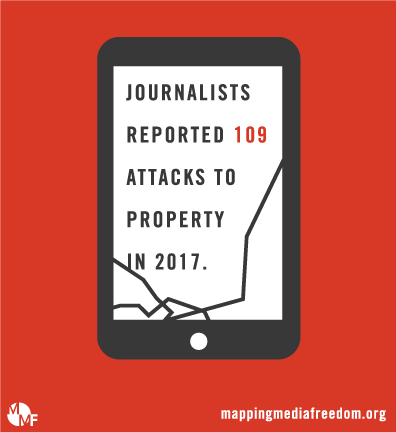 There were 109 attacks on the property of journalists in 2017. On the morning of 26 November Yulia Zavialova, editor-in-chief of the Russian investigative website Bloknot Volgograd, known for its coverage of political and business corruption, asked her father to have the tires on her car checked. Thirty minutes later he rang her to say the brakes were completely out of service. Her brakes had been cut and her anti-lock braking system was damaged. Zavialova called the police but, according to the journalist, they did not properly investigate the scene, failing to take fingerprints or full details of the damage.
There were 109 attacks on the property of journalists in 2017. On the morning of 26 November Yulia Zavialova, editor-in-chief of the Russian investigative website Bloknot Volgograd, known for its coverage of political and business corruption, asked her father to have the tires on her car checked. Thirty minutes later he rang her to say the brakes were completely out of service. Her brakes had been cut and her anti-lock braking system was damaged. Zavialova called the police but, according to the journalist, they did not properly investigate the scene, failing to take fingerprints or full details of the damage.[/vc_column_text][vc_custom_heading text=”Blocked access” use_theme_fonts=”yes”][vc_column_text]
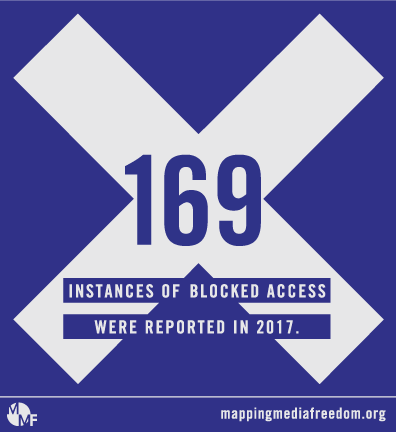 There were 169 confirmed cases of blocked access throughout Europe in 2017, in which journalists were expelled from a location or prevented from speaking to a source by way of obstruction. Many of these reports were connected to other violations, such as assault, damage to property and intimidation.
There were 169 confirmed cases of blocked access throughout Europe in 2017, in which journalists were expelled from a location or prevented from speaking to a source by way of obstruction. Many of these reports were connected to other violations, such as assault, damage to property and intimidation. [/vc_column_text][vc_custom_heading text=”Work censored or altered” use_theme_fonts=”yes”][vc_column_text]
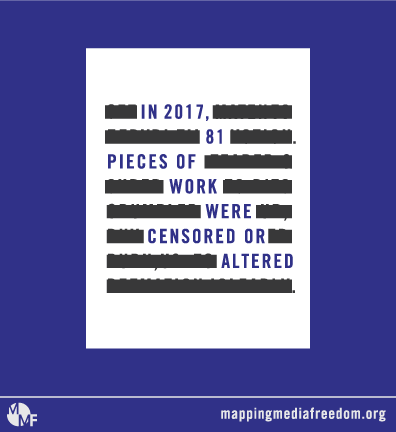 In 2017 Mapping Media Freedom documented 81 cases in which journalists had their work censored or altered. On 15 October in the city of Uppsala, Sweden, local newspaper UNT and public broadcaster SVT identified what they saw as a concerted effort by press officers at the local council to control statements made by staff to journalists. Both complained that press officers were exerting pressure on staff to change statements that reflect badly on the council.
In 2017 Mapping Media Freedom documented 81 cases in which journalists had their work censored or altered. On 15 October in the city of Uppsala, Sweden, local newspaper UNT and public broadcaster SVT identified what they saw as a concerted effort by press officers at the local council to control statements made by staff to journalists. Both complained that press officers were exerting pressure on staff to change statements that reflect badly on the council.[/vc_column_text][vc_separator color=”black” style=”dashed”][vc_column_text]
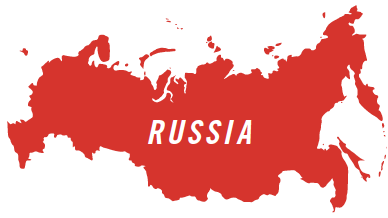 During protests organised by Russian lawyer and activist Alexei Navalny in March and June, 1,000 people were arrested, including 19 journalists, in Moscow, St. Petersburg, Makhachkala, Petrozavodsk and Samara. At a rally in Moscow on 26 March, police detained RBC correspondent Timofey Dzyadko, Mediazona publisher Piotr Verzilov, Open Russia correspondent Sofiko Arifdzhanova, Public Television of Russia journalist Olga Orlova, Echo of Moscow journalist Alexandr Pluschev and Kommersant-FM reporter Pyotr Parkhomenko. At the same rally, Guardian correspondent Alec Luhn was detained after he took a photo of a protester being arrested. He spent more than five hours at a police station without an explanation of why he was detained. Luhn was eventually charged with participating in an unsanctioned rally, even though he showed officers his press accreditation. At least nine media workers were detained across Russia on 8 October during further protests organised by Navalny.
During protests organised by Russian lawyer and activist Alexei Navalny in March and June, 1,000 people were arrested, including 19 journalists, in Moscow, St. Petersburg, Makhachkala, Petrozavodsk and Samara. At a rally in Moscow on 26 March, police detained RBC correspondent Timofey Dzyadko, Mediazona publisher Piotr Verzilov, Open Russia correspondent Sofiko Arifdzhanova, Public Television of Russia journalist Olga Orlova, Echo of Moscow journalist Alexandr Pluschev and Kommersant-FM reporter Pyotr Parkhomenko. At the same rally, Guardian correspondent Alec Luhn was detained after he took a photo of a protester being arrested. He spent more than five hours at a police station without an explanation of why he was detained. Luhn was eventually charged with participating in an unsanctioned rally, even though he showed officers his press accreditation. At least nine media workers were detained across Russia on 8 October during further protests organised by Navalny.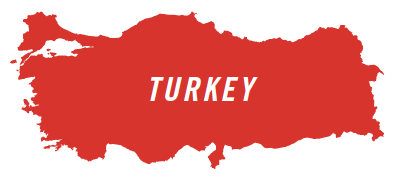 Although the number of violations reported to Mapping Media Freedom that took place in Turkey decreased between 2016 and 2017 — from 231 to 135 — the country remains the number one jailer of journalists in the world with 151 media workers behind bars by the end of 2017. In all, 65 journalists were jailed and sentenced on charges including the spreading of terrorist propaganda. At the trial of journalist Nedim Türfent, who reported on security operations in Turkey’s Kurdish majority provinces, at least a dozen people claimed they were tortured by police.
Although the number of violations reported to Mapping Media Freedom that took place in Turkey decreased between 2016 and 2017 — from 231 to 135 — the country remains the number one jailer of journalists in the world with 151 media workers behind bars by the end of 2017. In all, 65 journalists were jailed and sentenced on charges including the spreading of terrorist propaganda. At the trial of journalist Nedim Türfent, who reported on security operations in Turkey’s Kurdish majority provinces, at least a dozen people claimed they were tortured by police.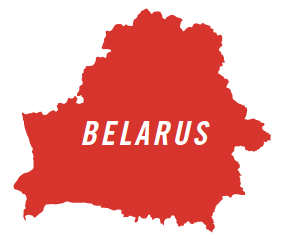 A total of 92 violations of media freedom were recorded in Belarus throughout 2017, including the detainment of 101 journalists. In all, 30 journalists received criminal charges. A wave of detentions occurred on the Belarusian holiday Freedom Day on 25 March, when 36 journalists were placed in custody. Olga Morva, Philip Warwick, Andrey Dubinin, Valery Shchukin, Katsiaryna Bakhvalava, Ihar Ilyash and Volha Davydava said they were beaten by police while under arrest. Warwick, from the United Kingdom, said he was denied the right to contact his embassy after being handcuffed and hit in the face; he spent over six hours at the police station. The apartment of journalist Maryna Kastylyanchanka, who works with human rights organisations, was searched. She was later jailed for 15 days for disobeying police and participating in the unsanctioned mass protests.
A total of 92 violations of media freedom were recorded in Belarus throughout 2017, including the detainment of 101 journalists. In all, 30 journalists received criminal charges. A wave of detentions occurred on the Belarusian holiday Freedom Day on 25 March, when 36 journalists were placed in custody. Olga Morva, Philip Warwick, Andrey Dubinin, Valery Shchukin, Katsiaryna Bakhvalava, Ihar Ilyash and Volha Davydava said they were beaten by police while under arrest. Warwick, from the United Kingdom, said he was denied the right to contact his embassy after being handcuffed and hit in the face; he spent over six hours at the police station. The apartment of journalist Maryna Kastylyanchanka, who works with human rights organisations, was searched. She was later jailed for 15 days for disobeying police and participating in the unsanctioned mass protests.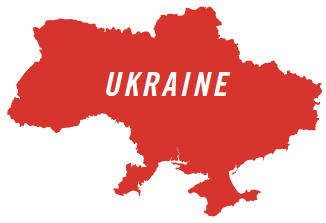 In all, 74 violations against the media in Ukraine were reported to Mapping Media Freedom in 2017. One of the most worrying trends included the treatment of foreign journalists or journalists working for Russian companies. Sixteen journalists were expelled from, or not allowed to enter the country, including some who worked for Russian state media outlets. There were three cases involving the abuse of Interpol warrants to arrest or detain foreign journalists in Ukraine by their countries of origin as a means of silencing critical voices. These were: Azerbaijan, Uzbekistan and Kazakhstan. Three journalists were arrested in territory controlled by self-proclaimed separatists in 2017, including Ukrainian blogger and writer Stanyslav Aseev, one of the few journalists contributing to western and independent media outlets in eastern Ukraine.
In all, 74 violations against the media in Ukraine were reported to Mapping Media Freedom in 2017. One of the most worrying trends included the treatment of foreign journalists or journalists working for Russian companies. Sixteen journalists were expelled from, or not allowed to enter the country, including some who worked for Russian state media outlets. There were three cases involving the abuse of Interpol warrants to arrest or detain foreign journalists in Ukraine by their countries of origin as a means of silencing critical voices. These were: Azerbaijan, Uzbekistan and Kazakhstan. Three journalists were arrested in territory controlled by self-proclaimed separatists in 2017, including Ukrainian blogger and writer Stanyslav Aseev, one of the few journalists contributing to western and independent media outlets in eastern Ukraine.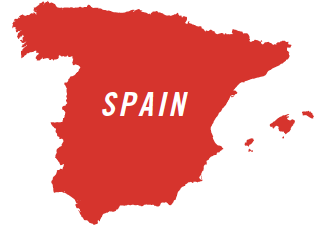 Between 2016 and 2017, media freedom violations in Spain increased from 56 to 66. Journalists experienced difficulties before, during and after the referendum on Catalan independence on 1 October. In July the daily newspaper La Vanguardia, based in Barcelona, refused to publish a column written by Gregorio Morán in which the journalist criticised the “corrupt” regional government of Catalonia. Morán also accused the Catalan media of receiving sums of public money, adding that it was therefore no surprise to see them supporting Catalan independence.
Between 2016 and 2017, media freedom violations in Spain increased from 56 to 66. Journalists experienced difficulties before, during and after the referendum on Catalan independence on 1 October. In July the daily newspaper La Vanguardia, based in Barcelona, refused to publish a column written by Gregorio Morán in which the journalist criticised the “corrupt” regional government of Catalonia. Morán also accused the Catalan media of receiving sums of public money, adding that it was therefore no surprise to see them supporting Catalan independence. [/vc_column_text][vc_column_text]
[/vc_column_text][vc_column_text]
[/vc_column_text][vc_column_text]
[/vc_column_text][/vc_column][/vc_row][vc_row equal_height=”yes” css=”.vc_custom_1521129408155{background-color: #d5473c !important;}”][vc_column width=”1/2″][vc_custom_heading text=”Protect media freedom”][vc_column_text]
We monitor threats to press freedom, produce an award-winning magazine and publish work by censored writers.[/vc_column_text][/vc_column][vc_column width=”1/2″ css=”.vc_custom_1521129253575{background-image: url(https://www.indexoncensorship.org/wp-content/uploads/2018/03/MMF_2017_map-standalone.jpg?id=98665) !important;}”][/vc_column][/vc_row][vc_row][vc_column][vc_empty_space][/vc_column][/vc_row]
[vc_row][vc_column][vc_column_text]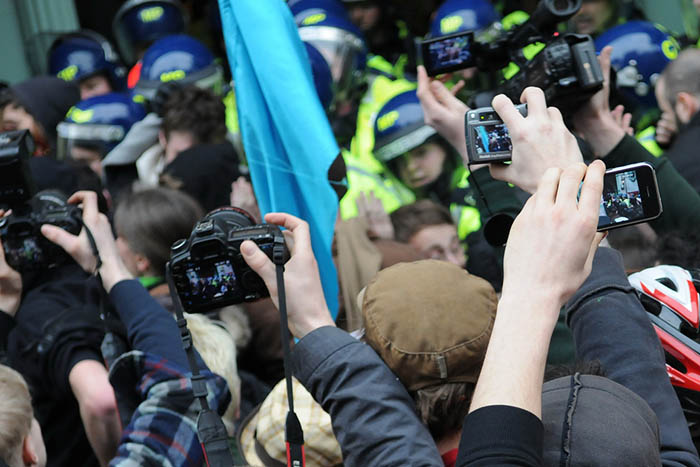
Each week, Index on Censorship’s Mapping Media Freedom project verifies threats, violations and limitations faced by the media throughout the European Union and neighbouring countries. Here are recent reports that give us cause for concern.
Five journalists were detained in Orsha on 12 March after covering a protest against a new law that would tax unemployed people labeled as “parasites”, Radio Svaboda reported.
Radio Svaboda’s Halina Abakunchyk, photographer for BelaPAN Andrei Shaulyuha and blogger Anastasia Pilyuhina were detained after the rally along with demonstrators and taken to Orsha district police department.
Freelance journalists working for TV channel Belsat, Alyaksandr Barazenka and Katsyaryna Bahvalava, went to the police station to get a comment from a detained opposition activist, only to be detained as well. Pending trial they spent the night in jail.
Abakunchyk and Bakhvalava were ordered to pay fines. Abakunchyk was accused of participating in an unsanctioned mass event under Aryicle 23.34 of the Code of Administrative Offences and fined approximately €280. Bakhvalava was accused of illegal production and distribution of media products and disobeying the police under Article 22.9 and Article 23.4 of the Code of Administrative Offences and fined approximately €340.
Up to 18 journalists and bloggers were arrested while covering the protests, IFJ reported.
Conservative MP Jean-François Mancel filed a proposed law to the National Assembly on 10 March which intends “to remove protection of the confidentiality of journalistic sources if protection of the public interest justifies it“.
The proposed law reads: “Contrary to what is generally said by journalists and their representatives, the systematic protection of sources’ confidentiality and the will to further reinforce it seriously compromises the respect of individual freedoms and the protection of civilians against acts of aggression from the media.”
Mancel accused journalists who have covered allegations of fraud involving conservative candidate François Fillon of going after the candidate unfairly, for instance on his Twitter account.
[/vc_column_text][/vc_column][/vc_row][vc_row equal_height=”yes” css=”.vc_custom_1490021682242{background-color: #d5473c !important;background-position: center !important;background-repeat: no-repeat !important;background-size: cover !important;}” el_class=”text_white”][vc_column width=”1/2″][vc_column_text]
[/vc_column_text][/vc_column][vc_column width=”1/2″ css=”.vc_custom_1490021461628{background-image: url(https://www.indexoncensorship.org/wp-content/uploads/2017/01/MMF_report_2016_WEB-1-1A.jpg?id=85872) !important;}”][/vc_column][/vc_row][vc_row][vc_column][vc_column_text]
Hakan Büyük, a Turkish-Dutch journalist for the newspaper Zaman Vandaag has been receiving death threats on Twitter, news portal Villamedia reported on 13 March.
The threats began after a diplomatic row between Turkey and The Netherlands led to violent pro-Erdogan protests in the streets of Rotterdam. Earlier, Dutch authorities banned a Turkish minister from campaigning for an upcoming Turkish referendum.
Büyük received at least ten threats in Turkish, one of which read: “We will not arrest you, you will be killed.” He has filed charges with the police.
Zaman Vandaag was founded by Gulen sympathisers, who are being blamed for the failed coup in Turkey in the summer of 2016.
Unidentified protesters assaulted and verbally harassed two different TV crews during a pro-opposition protest on 10 March in Skopje, news agency META reported.
Hristijan Banevski, a reporter for private broadcaster TV 24, was “firstly verbally attacked and then hit in the head with a stick holding a flag during the protest in Skopje”.
That same night, a TV Telma crew was verbally harassed while interviewing protesters. Without giving much detail, the channel reported that their journalists were cursed at.
Local journalists’ associations have called upon the Macedonian institutions to take appropriate measures and to come out in defence of the journalists, news agency META reported.
President of the Association of Journalists of Macedonia (ZNM), Naser Selmani, underlined that what is worrying is that public officials, including representatives of state institutions, participated in these coordinated attacks.
In the last four years, according to ZNM’s data, 44 attacks against journalists were reported in Macedonia. Out of these, 19 occurred in 2016.
Officers from the Russian Security Service (FSB) detained reporter Igor Zalyubovin and photographer Vladimir Yarotsky for the Moscow-based independent news magazine Snob on 7 March, the publication said in a statement. The journalists were in the apartment they rented to report on daily life in the city of Svetogorsk.
An article was planned as a response to Svetogorsk Mayor Sergey Davydov’s 1 March claim that there were no homosexuals in the city, and that it was a “city without sin,” according to press reports.
On 7 March, the Committee to Protect Journalists issued a statement saying Russian security services should stop harassing and obstructing journalists and should allow them to work unimpeded.
To visit Svetogorsk requires either a Schengen visa to enter via Finland, an invitation from a local resident, or a special permit from the FSB, according to 2014 legislation. Snob’s editor-in-chief, Yegor Mostovshikov, told the news website Meduza today that his outlet did not apply for a permit from the FSB “because it takes up to 30 days to get it.”[/vc_column_text][/vc_column][/vc_row][vc_row][vc_column][vc_column_text]
Click on the bubbles to view reports or double-click to zoom in on specific regions. The full site can be accessed at https://mappingmediafreedom.org/
[/vc_column_text][/vc_column][/vc_row][vc_row][vc_column][vc_basic_grid post_type=”post” max_items=”4″ element_width=”6″ grid_id=”vc_gid:1490021029215-ef5a3b8c-778c-2″ taxonomies=”6564″][/vc_column][/vc_row]